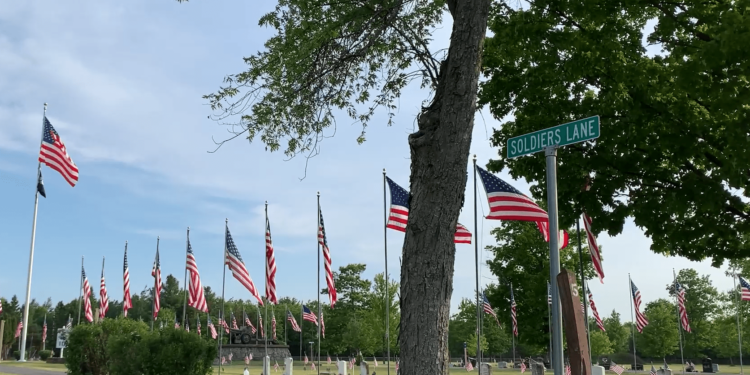IRON MOUNTAIN, Mich. (WZMQ) – In 2019, ‘the progressive city’ lost a veteran to a terminal illness– Gerald Elliott. His passing would spark a legislative journey, spearheaded by Denise Formolo, a determined Dickinson County Veteran Service Officer.
Dubbed “Gerald’s Law,” the legislation aims to close a loophole safeguarding veterans and their families from burial coverage denial. Formolo, the author of the bill, uncovered the loophole following his passing. The law, designed to prevent veterans and their families from being denied approximately $2,000 in burial benefits for choosing end-of-life care at home, has gained significant momentum.
“It was introduced in the house in 2020, again in 2023 because it didn’t get through the house in 2020-2021 session, because they were dealing with the PACT act at the time – which we much rather would have seen that get passed – because that’s very, very huge for all our veterans… It was introduced in 2022,” [by Rep. Bergman] informed Formolo. “It was voted on almost instantly,” she added.
With an overwhelming House approval of 409-9, Gerald’s Law addresses the current limitation where burial benefits solely apply to veterans who pass away in a VA hospital or due to a service-connected disability.
“HR 234 will address this by extending VA burial allowance eligibility to veterans whose deaths occur at home when receiving VA hospice care if they were previously receiving VA hospital or nursing home care,” stated Michigan Congressional Representative Jack Bergman in his testimony about nine months ago when the Bill sat in front of the House.
The spotlight is now on the Senate, where the legislation sits titled S. 1330 – Gerald’s Law Act.
Formolo expressed her determination, stating, “I’m lucky to have the opportunity to go to Washington, D.C. in February with the National Association of County Veteran Counselors. My top priority will be urging our Senators to move this bill out of committee and secure a Senate vote.”
Congress.gov summarizes Gerald’s Law Act, stating: “This bill requires the Department of Veteran Affairs (VA) to provide a burial and funeral allowance for a veteran who dies from a non-service connected disability in a home or other setting at which the veteran was receiving VA hospice care (if such care was directly preceded by VA Hospital or nursing home care).”
The legislation, now awaiting action from the Senate Veterans’ Affairs Committee, mandates burial benefits for non-service connected disability veterans in hospice and post-VA hospital or nursing home care.
Formolo, recounting the origin of the law, explained, “Gerald’s family assumed he was covered for burial benefits, having been under VA hospice care at home. However, their application was denied.” She began unraveling a loophole – hospice care at home wasn’t considered under VA healthcare, so an appeal of the denial led to another denial for burial benefits to the family.
Michigan Congressional Representative Jack Bergman testified passionately in the House, on behalf of the veteran, who was a lifelong Yooper, Kingsford resident, member of the American Legion Post 363, and an active volunteer at the Oscar G. Johnson VAMC. Despite receiving hospice care at home through the VA, Gerry’s family discovered they didn’t qualify for burial benefits after his death.
Formolo, the law’s author, shared her concerns: “Hospice care, even provided through the VA, was not considered, and is not to this day considered healthcare through the VA.”
Highlighting the urgency of the matter, Rep. Bergman stressed, “No veteran or their families should have to worry about losing VA benefits for their family when choosing to spend their last days in the comfort of their loved ones in their own home.”
As Formolo tirelessly wrote to the committee members through Christmas, she is set to take her concerns to Washington, D.C. next month. Her mission includes cold-calling senators to emphasize the importance of Gerald’s Law, which she believes could impact every veteran who served in the United States military.
‘Facing financial concerns in the final moments of a veteran’s life should not be acceptable’, Formolo emphasized, urging the public to contact their senators about Gerald’s Law as she prepares for her crucial visit to Washington, D.C. from February 3rd to Feb 9th.
“It’s a no-brainer,” Formolo stated. “Who wouldn’t want a veteran to find peace at home?”
Representative Jack Bergman, testifying on behalf of the law, highlighted Gerald’s story as a poignant example. “After receiving a cancer diagnosis in 2019, he was admitted to the Iron Mountain VA for care. As the disease progressed, and he was placed in hospice, he decided to go home to live out his final days in some level of positivity with his family…Gerry’s family discovered that the fact that he had received these benefits at home meant his family did not qualify for burial benefits after his death. Under current law, VA hospice care provided at home does not qualify as a ‘death under VA care’ and is therefore not covered under the ‘non-burial, plot benefit’. As a result, if a veteran with a terminal illness wants full burial benefit, they would be forced to die in a hospital or nursing home through the VA instead of transferring to home hospice care to be with their loved ones. This injustice is unacceptable.”
As February approaches, Formolo will seize the opportunity to take a fight directly to Washington, DC. “We’ll be cold-calling senators and representatives,” she declared, as she prepares to push for Gerald’s Law to be freed from committee shackles and voted on in the Senate.
As the fight for justice for veterans’ end-of-life care continues, the fate of Gerald’s Law hangs in the balance, awaiting a resolution that could bring some solace to service members and their families nationwide.









